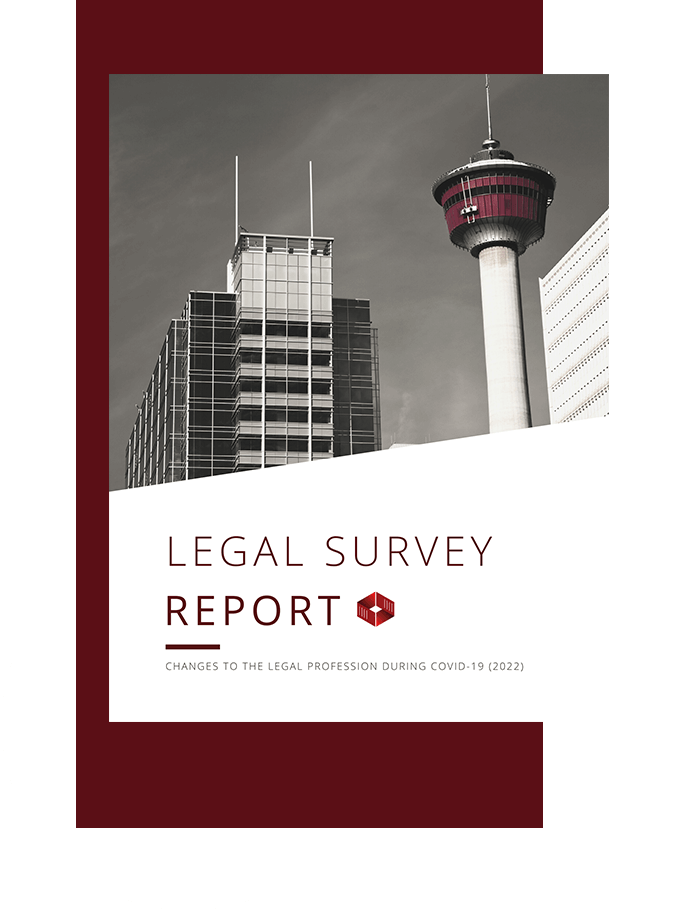
Develop a Policy to Support Your Employees Working from Home
Earlier this month, we published a blog post relating to our 2022 Legal Survey which found that law firms in Canada may be facing a crisis of retention. Only 4 in 10 respondents stated that they had no intention of making a change in their career. Additionally, firms are likely to find themselves divided into two groups — those that have the type of workplace that will make it difficult to attract new talent, and those that will not only retain but actually attract new talent (likely lawyers and staff exiting firms in group one) due to what they offer employees.
We asked respondents to rate how their firm handled the Covid-19 Pandemic. Those who gave their firms five stars (out of five) were 40% more likely to state that they had no intention of making a change in their career, which should provide a significant boost to retention.
While there are many characteristics that make up a five-star firm, these organizations are highly correlated with firms that offer a hybrid or work-from-home (WFH) arrangement. Fully 80% of respondents who gave their firm five stars had such an arrangement during the pandemic, and 95% of those individuals expected their firm to permit a similar arrangement to persist into the future.
Our last post discussed the benefits of flexible work arrangement to your firm. In this blog post, we will review the best practices for supporting those employees working at least partially at home.
It is not enough to begrudgingly let employees work at home one day a week and call it a benefit; a WFH arrangement needs to be thoughtful, it needs to support the employee in the tasks that comprise their job, and it needs to keep them connected to the office and their team.
Develop a Clear Work-from-Home Policy
Most importantly, set clear expectations. While one might think that this accrues more to the benefit of the firm, it does not. Clear guidelines and goals help employees know what is required to be successful in their position.
WFH, in a certain sense, relaxes many aspects of the job (for instance, dress code), so knowing what really matters is critical. Additionally, WFH can sometimes blur the line between when someone is working and not, and schedules can become a bit more irregular, causing employees to feel they must always be available. (And, sure, it will help the employer get what they need out of their employees.)
A good WFH policy, in concert with regular reviews, should do the following:
-
Set Primary Evaluation Standards
How will you know your employees are working and contributing what they would be if they were at the office? Outline what is required for the employee to meet the minimum standards of their job. Try to stay away from simply a number of hours worked. According to Parkinson's law, ”work expands so as to fill the time available for its completion.”Setting a number of hours as a primary goal means you might get the hours at a desk, but not the underlying product you want. Look for productivity indicators. For lawyers and any other employee who records time or billings, this might be hours or dollar amounts billed, as well as quality standards in their work. For employees who do not record time, this can be more difficult, but meeting the expectations of those who supervise them, work with them, and those they supervise should be at the top of the list. In addition, many technologies (including Tracument) contain analytics that can help your employees understand their relative productivity over time.
-
Set Guidelines
Is the employee allowed to WFH only at their residence, or can they do so during regular business hours when they are otherwise on a trip? Will everyone have cameras on during a meeting? Can an employee who expects to be working from home on a given day be compelled to come into the office? Employees should understand the number and schedule of hours they must work, including meeting expectations, availability, and do not disturb time for focus. The policy should set out meeting guidelines (acceptable hours, length, format, camera or in-office attendance requirements, etc.). -
Set Technology Requirements
Who is providing the technology being used at home? Is the employee sufficiently connected? What happens if the Internet goes down? Who pays for everything? Is the employee distracted or uncomfortable? Outline very clearly what technology is being provided and what technology the employee must provide. -
Set Review Methods
What happens if an employee who was excellent in the office, does not excel at home. Build provisions for review and termination into your contract, as well as recourse for your employee to discuss any issues that arise. The goal is to work together to improve productivity for the business and work-life balance for the employee.
Need help? Tracument has a robust WFH policy that we are willing to share under certain conditions. We are also more than happy to show any of our clients how they can use onboard analytics to help their employees remain productive. Contact info@tracument.com if you are not yet a client — or support@tracument.com if you're an existing client — to learn more.
Next post, we focus on how to support your employees technologically.
If you are interested in learning more about WFH technologies and how to support remote employees, I invite you to download our free 2022 Legal Survey Report, which provides an enormous amount of data and includes a more in-depth discussion of the above topics.
You may also like
Happy Holidays Message from David Swadden, CEO
December 18, 2025
We would like to wish all our clients and readers a wonderful holiday season filled with joy and laughter.
Tracument Holiday Schedule
December 11, 2025
We would like to update all our clients of our Holiday Schedule this holiday season!
Tracument Wrapped!
December 4, 2025
What 2025 Looked like for Tracument and for you!




